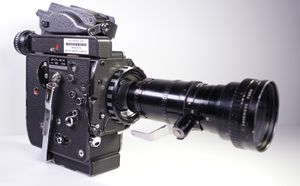Difference between revisions of "APS Bolex 16mm Reflex Proficiency Test"
From Help Wiki
m (grammar) (Tag: VisualEditor) |
|||
| (2 intermediate revisions by one other user not shown) | |||
| Line 4: | Line 4: | ||
<div class="col-md-8"> | <div class="col-md-8"> | ||
<div class="lead"> | <div class="lead"> | ||
| − | Please read the [[APS Bolex 16mm Reflex Operating Guide]] to complete the written portion of test '''prior''' to in-person operational proficiency. Bring test answers to your scheduled proficiency, with your name and TESC ID number clearly indicated.[[File:Bolex bayonet front.jpg|thumb]] | + | Please read the [[APS Bolex 16mm Reflex Operating Guide]] to complete the written portion of test '''prior''' to in-person operational proficiency. |
| + | |||
| + | '''Bring''' test answers to your scheduled in-person operational proficiency, with your name and TESC ID number clearly indicated.[[File:Bolex bayonet front.jpg|thumb]] | ||
</div> | </div> | ||
| Line 10: | Line 12: | ||
# What additional accessories do you need to check out in addition to the Bolex? | # What additional accessories do you need to check out in addition to the Bolex? | ||
# List the four steps necessary to set the diopter adjustment. | # List the four steps necessary to set the diopter adjustment. | ||
| − | |||
# How does changing the frame rate (frames per second/fps) effect the look of the film? | # How does changing the frame rate (frames per second/fps) effect the look of the film? | ||
# What is the standard frame rate for shooting on 16mm film? | # What is the standard frame rate for shooting on 16mm film? | ||
| Line 17: | Line 18: | ||
# What is the function of the turret plug? | # What is the function of the turret plug? | ||
# List the steps necessary to load the camera. | # List the steps necessary to load the camera. | ||
| − | # | + | # To avoid fogging the film, what part of the camera must always be in up-right (vertical) position when the cameraperson's eye is not against the eye cup? |
| + | # How do you know when the variable shutter is closed? What is the consequence of not being sure of its position? | ||
# What should you always do before putting the Bolex away? | # What should you always do before putting the Bolex away? | ||
# What is the extent of your financial responsibility in case of loss, or damage to the camera? | # What is the extent of your financial responsibility in case of loss, or damage to the camera? | ||
| Line 52: | Line 54: | ||
__NOEDITSECTION__ | __NOEDITSECTION__ | ||
<!-- Generator=Template:TwoColumn --> | <!-- Generator=Template:TwoColumn --> | ||
| − | [[Category:Media Loan]] | + | [[Category:Media Loan Tests]] |
Latest revision as of 11:01, 21 January 2021
Please read the APS Bolex 16mm Reflex Operating Guide to complete the written portion of test prior to in-person operational proficiency.
Bring test answers to your scheduled in-person operational proficiency, with your name and TESC ID number clearly indicated.Written Test
- What additional accessories do you need to check out in addition to the Bolex?
- List the four steps necessary to set the diopter adjustment.
- How does changing the frame rate (frames per second/fps) effect the look of the film?
- What is the standard frame rate for shooting on 16mm film?
- Explain the difference between Bolex RX lenses and non-RX lenses. What do you need to do to compensate for the difference?
- Describe the difference between a bayonet mount and a turret mount camera.
- What is the function of the turret plug?
- List the steps necessary to load the camera.
- To avoid fogging the film, what part of the camera must always be in up-right (vertical) position when the cameraperson's eye is not against the eye cup?
- How do you know when the variable shutter is closed? What is the consequence of not being sure of its position?
- What should you always do before putting the Bolex away?
- What is the extent of your financial responsibility in case of loss, or damage to the camera?
Operational Proficiency Test
- Identify all of the parts and control of the Bolex H16.
- Set the diopter
- Show how to wind the camera motor
- Demonstrate how to insert and change filters in the camera.
- Set the fps at 24, set the counter at 0.
- Observe the differences between slow and fast frame rates.
- Load film in the camera.
- Demonstrate how to create a lap dissolve.
- Demonstrate extended exposure and animation features.
- Display proper lens mounting on both the turret and bayonet mount cameras.
- Properly attach a cable release.
- Demonstrate how to use a rewind.
- Wind the camera down before putting it away.

